Text
Jason Statham Can Save His Friends from Sharks, But He Can’t Save This Film
youtube
The Meg
Jack Morris (Rainn Wilson), a wealthy man looking for an investment opportunity, takes a trip to China to visit his new research station. Here, scientists work day and night in attempt to uncover an unknown level of the ocean floor under a layer of frozen gas. In the midst of their investigation, they unintentionally discover the Megalodon, gigantic prehistoric shark thought to have been extinct. With a group of brave explorers trapped within the Megalodon’s territory, it is up to Marine Biologist Jonas Taylor (Jason Statham) to step up to the plate when he is called to rescue them.
Despite the promising presence of well liked Jason Statham, the actor does not do much to save this film from the endless shark/disaster movie cliches. While this film is filled with comic relief, it almost has too much of this as it begins to get lost and separate itself from any excitement, terror, and suspense that this type of film is meant to focus on.
The Meg opens with a scientific discover unbeknownst to the audience, as well as most characters. Not much time is spent exploring the discovery; the plot then stumbles through countless shark attack scenes which lack thrill and surprise. Instead, they are simply nothing more than gory slaughters.
Director Jon Turteltaub should have focused more on adding suspense to the discovery of the shark, as well as exploring the depth and darkness of Statham’s character (a man permanently haunted when a rescue mission conducted solely by him results in the deaths of his two friends). There is too much focus on action and gore that there is absolutely no space left for any shock factor or important emotional moments. The only positive thing I can say about The Meg is it’s cultural diversity. Even then, some representations are stereotypical, and even borderline offensive. None of the characters make much of an impact.
0 notes
Text
Yes, It’s Pretty Accurate
youtube
Eighth Grade
Eighth Grade, directed by YouTube personality Bo Burnham takes viewers into the day by day life of Kayla Day (Elsie Fisher), a socially anxious and quiet 13 year old navigating the rough waters of her last week of middle school. She is known for being the least talkative student in her grade, as she is even voted “most quiet” for Yearbook Superlatives. Although she says relatively little to her peers in person, Kayla frequently posts short videos on her YouTube channel in the comfort and privacy of her bedroom. Her videos are topic-centred and focus on things such as confidence, and “putting yourself out there”, something that Kayla struggles to do. Raised by a caring but often clueless single father (Josh Hamilton), Kayla treads through a messy lead-up to graduation that features adventures such as an awkward crush on the popular boy, a forced invitation to a birthday pool party, to a dramatic day at a local high school open house.
Fisher could not be a more perfect point-of-view perspective of the challenges that come along with early teenage years in the age of obsessive social media and technology use. This is a girl who, as many adults often joke about, it surgically attached to her phone. Though Burnham has never experienced what it is like to be a teenage girl, he understands that the middle school years are the most awkward and uncomfortable years of an adolescents life. Eighth Grade, in particular, can be an extremely fragile time as kids are edging closer and closer to high school, and coming to terms with puberty, social status, and preparing for the treacherous years ahead of them. The film tackles these subjects through both tongue-in-cheek comic relief, as well as more dramatic, touching scenes. Kayla convinces herself that she is fine with being the most quiet girl in her class because at home she can open up. Through her frequent YouTube postings, she gives advice on gaining confidence, stepping out of one’s comfort zone, along with many other self-help related topics. Her personal goals are universal, and relatable. She wants friends - specifically, a best friend, and possibly a boyfriend. Essentially, the only obstacle standing in her way is herself.
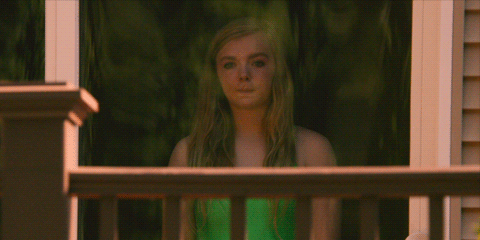
The film both warms the heart and breaks it in many unique ways, and it could be specifically heartbreaking for parents of children around Kayla’s age. Luckily, Eighth Grade does end on a somewhat hopeful note. Kayla comes to understand that making friends and establishing a strong connection with her father are both possible. There is a wonderful moment in which Kayla finds the inner strength to realize that it’s okay to be grateful and appreciative, to be goofy and laugh out loud, and to not be in any rush to grow up.
Kayla’s pain could not be more realistic, but it is nothing compared to the pain audiences will feel as this kindhearted young girl struggles to find her place in the age of a vicious social environment.
0 notes
Text
The Horror of the Family Bloodline
youtube
Hereditary
Hereditary establishes itself as a unique take on the things that go bump in the night, and shows us that these things may be closer to us than they appear. This is not a horror film about apparitions, a haunted house, or a serial murderer. It is about a family. We are first introduced to Annie Graham (Toni Collette), her husband Steve (Gabriel Byrne), their high-school stoner son Peter (Alex Wolff), and their extremely socially awkward daughter Charlie (Milly Shapiro) when they are getting ready to attend the funeral of Annie’s mother, Ellen.
“My mother was a very secretive and private woman. She was a very difficult woman which, maybe explains me. She had private rituals, private friends... she wasn’t all together there, at the end.”
Ellen had ruled over the Graham family with a rare matriarchal power - a power that drew her granddaughter Charlie closer to her in more of a mother-daughter type of way, leaving Annie envious of the bond. It is not too long before another tragedy strikes this dysfunctional family and Annie begins to believe, with the help of her new grief support group friend Joan (Ann Dowd) that her mother may never truly be gone. The film builds like an incoming storm when Annie attends an open seance, Peter starts acting out at school, Ellen’s body goes missing, and Charlie is hiding mysterious things in her treehouse, Steve feels helpless to intervene.
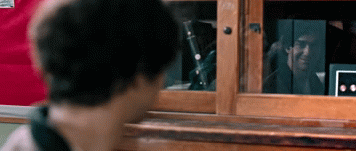
Hereditary achieves the main goal that every horror film strives for - to maintain a hold on its audience. The film is essentially in its own imbalanced world. The nightmarish score by saxophonist Colin Stetson will haunt you late at night, and you will not be able to get the visual effects of prosthetics and make-up artist Steve Newburn out of your head. Hereditary does not keep it’s audience interested through gore, it achieves this effect through its examination of the mind, and how we cannot escape what we inherit. It gives us a realistic dysfunctional family to contemplate, and hints that a winning combination of both domestic abuse and a long history of mental illness is more frightening than being possessed by any demon.
Wolff and Collette are both fantastic in their roles, but it is Collette who gives the performance of her career. She takes us inside the numerous mental breakdowns of her character in ways that would keep any viewer up at night.
0 notes
Text
A Sad Yet Truthful Mother-Daughter Tale
youtube
Lady Bird
Christine “Lady Bird” McPherson is quickly reaching her high school graduation at a religion-based private school in Sacramento California. Like many other young adults, college is the only thing on her mind. But after her father (Tracy Letts) loses his job, her family cannot afford to send her to any of her top choices. Meanwhile, Lady Bird and her mother (Laurie Metcalf), who are so similar yet still so different from one another, are constantly butting heads. To improve her chances of getting a scholarship, Lady Bird joins her school’s theatre club where her first love interest (Lucas Hedges) comes into play. Unfortunately, their relationship ends on a sour note. She later meets a local musician and is tempted by him along with his entourage to abandon her childhood friends. The whole time, Lady Bird - who cannot wait to leave her home, cannot seem to keep herself from getting into trouble. As she concocts a wild plan to get her to a school in New York, she comes to realize that home is where the heart is, and that you truly do not know how much you have until it’s gone.
In her directorial debut, Greta Gerwig explores conflicts within the world of childhood and adulthood, and mother-daughter relationships. Inspired by her teenage life spent in her hometown, Gerwig plays out her own story through the perspective of Lady Bird (Saoirse Ronan), who delivers each witty line with a sprinkle of soul and humanity. This is a film, more than anything else, that focuses mainly on a specific time, a mind state, and an emotional place. Each aesthetically pleasing scene seems to wander off the tracks in a very beautiful and meaningful way. Even some scenes that have nothing to do with the main protagonist character follow some of the secondary characters for no other reason than the fact that Gerwig found them to be funny, heartbreaking, or interesting at a given moment. Lady Bird’s mother is given a central focus throughout the film. She is often unreasonable and cold towards her husband and their children, but deep down she is a very loving woman. In my opinion, it is her who gives the winning performance of the film.
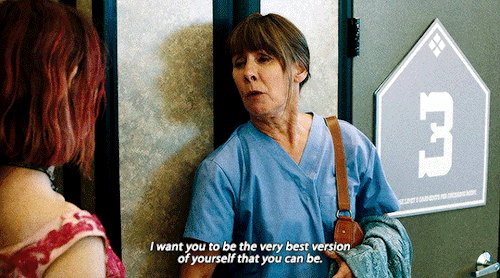
Overall, the use of visual pleasing landscape images, a timely soundtrack and a rapid pace that allows a wonderfully warm and human story to play out on the big screen.
0 notes
Text
The Problem With Anger
youtube
Three Billboards Outside Ebbing, Missouri
This exceptionally well-acted black comedy/crime drama tells the story of Mildred Hayes (Frances McDormand) a grieving single mother whose only daughter Angela was brutally murdered several months prior to when the film begins. What angers her even more than the fact that a man took her innocent child’s life is that the Ebbing police department do not seem to care. Frustrated and tired of waiting on results, Mildred takes matters into her own hands by renting out three billboards with a bleak message for Police Chief Bill Willoughby (Woody Harleson), singling him out for not having a single suspect for her daughter’s killer after seven months. Tribulation arises once people in town begin to notice the billboards and consider them a hateful statement against a well-known town “hero”. The act also does not sit well with the most corrupt, racist police officer Jason Dixon (Sam Rockwell). Surprisingly, it is none other than Dixon who eventually decides to step up and help.
Three Billboards is the third film by award-winning playwright Martin McDonagh. This is film mixes together the genres of drama and comedy, showing through the use of witty and clever dialogue how truly human each character is. It brings together themes of hope, love, hate, and rage, in the same way that grief does. Each character tackles their own obstacle, such as murder, cancer, and racism.

This is not a film about redemption, revenge or solutions. Though McDonagh seems to present everything in a pitch-perfect, neat-as-a-pin manner, this movie is about the flaws and messiness of the state of the world.
0 notes
Text
A Real-Life Fairy Tale
youtube
I, Tonya
Since the early 30s, womens competitive figure skating has not just been about technical skill. A champion needs to be an ice princess. She must be a graceful ballerina, or an angel, shimmering across the ice in sparkles and sequins with beautifully pulled back hair. Tonya Harding (Margot Robbie) was a far cry from such things. In one of the very first scenes of the film, she is asked in an interview to describe most people’s impression of her. After taking a few puffs on a cigarette, she looks straight into the camera and says, “That I’m a real person. I never apologized for growing up poor or being a redneck... which is what I am.” In a world of petite female skaters who look more like Disney pixies than real women, Tonya was physically strong, competitiveness ran through her blood, and she was not afraid to say exactly what was on her mind. While other girls giggled and sipped tea with their pinkies up, Tonya would grab a beer straight from the fridge and chug it in one shot.
Tonya’s mother Lavona Harding (Allison Janney) realizes her daughters drive and talent early on and pushes it to the physical and mental limits. She is frequently seen abusing her daughter, on one occasion hitting her with a hairbrush and telling her that she will never amount to anything. On another occasion, a teenage Harding gets into a heated dinnertime argument with her mother about her skating. In a drunken rage, Lavona throws a knife which lands in her young daughters arm. To justify her behaviour, she tells an interviewer that Tonya could only skate well if people told her that she could not. It is her mother’s instability and questionable parenting style that worries coach Diane Rawlinson. She even shares with Lavona the importance of Tonya not only fitting in with her fellow skaters, but also the way she is being raised. Her mother is quick to dismiss this ideology and instead argues that Tonya does not need to be like the other skaters because she is only twelve years old and can land triple axels.
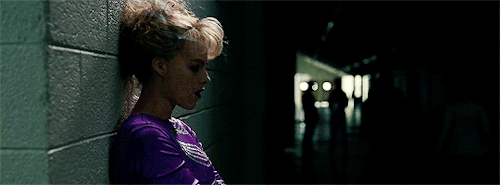
As Tonya continues to grow up and advance throughout her skating career, she begins to realize that although she can temporarily impress the judges with her athletisicm and daring jumps, they are always looking for something more - a barbie doll on skates. In the 90s, her scores begin to slip in competitions. At the 1992 Olympics, she places fourth. She finishes sixth in 1993. When the time comes to qualify for the 1994 Lilliehammer Olympic Games, her odds of making the U.S team are low. When the skating is almost hopeless, the jumps and spins have become “been there done that”, and she’s called a “has-been”, the desperation for her dream to come true takes over. But this doesn't mean that she’d go so far as to guarantee a spot on the team by eliminating a rival... would it? Around the middle of the movie, we arrive at the exact place that viewers have come for - the so-called “incident”.
“America... they want someone to love, but they want someone to hate.”
Like almost any celebrity, Tonya was surrounded by drama. Whether it was the constant torment of her mother, the physical abuse she endured from husband Jeff Gilooly (Sebastian Stan), and of course, the infamous attack on fellow skater Nancy Kerrigan. In the film, every character refers to the attack as an “incident”. The film, in its own way, addresses how exactly Kerrigan got her knee bashed and the involvement of members of Harding’s inner circle in one of the biggest scandals in the history of the Olympics. The movie primarily offers these answers through Tonya’s perspective, persuading audiences that Tonya had no knowledge of bodyguard Shawn Eckhardt’s plot to hire a couple of dopey hitmen to disable Nancy Kerrigan. Each character points fingers at the next after taking a moment to break the fourth wall, look directly into the camera and declare their innocence. Even Jeff Gilooly states that it was only supposed to be a little death threat in a letter.

I, Tonya is not trying to make us like Tonya or even sympathize with her. It is a fresh take on a story that is over twenty years old. Still, there is a lesson underneath all of the layers - growing up, especially in the crucial, earliest years, a word or two of encouragement couldn't do any harm to a child. The film is described as a dark comedy, although it does not fail to include many of the elements of a Shakespearian - style tragedy.
“The haters always say... Tonya, tell the truth. There’s no such thing as truth. Everyone has their own truth.”
There is truth in this film. The truth is that Tonya was made into a villain by people who did not take the time to hear her side of the story. The truth is that she was made into the subject of a joke. She was loved, and then she was hated. After that, she was just a punchline. Tonya’s story is told in a way that allows viewers to feel all of her pain, while in contrast making them laugh, and even making them a little teary-eyed by the time Harding is banned from her sport for life.
0 notes
Text
Stylistic Violence, Meta-Humor, and Rock & Roll
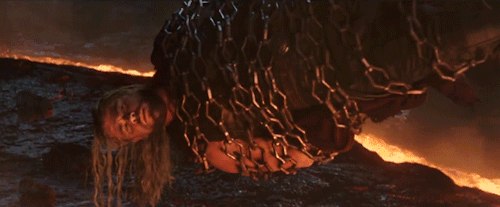
Thor: Ragnarok
With a wild storyline and plenty of bold choices, the third installment in Thor’s stand-alone franchise pushes boundaries as the Marvel Cinematic Universe’s most daring entry thus far.
Plagued with visions of the end of Asgard and the death of the gods, Thor (Chris Hemsworth), son of Odin, acts to avert the long-foretold disasters and threats. After suffering a personal loss, Thor comes to discover some terrifying truths regarding his family, and Asgard itself. The only way in which he will escape captivity is with the help of Valkyrie (Tessa Thompson), along with old Avengers buddy Hulk (Mark Ruffalo). Together, the three must face against the powerful wrath of Hela (Cate Blanchette), the Goddess of Death.
The film, much like that of The Avengers, is packed with sword vs. sorcery sci-fi action, while not taking itself too seriously (its as goofy and playful as the Guardians of the Galaxy films. Similar to the previous Thor films, it even allows for genuine, realistic character development. Thor: Ragnarok is a fast-paced, unrestrained cauldron of demons and dragons, Gods and Goddesses, lasers, spaceships, wormholes, as well as Gladiator-style revolution and combat. There is even a little dash of magic when Doctor Strange (Benedict Cumberbach) stars in a comical scene. The ingredients of all these diverse elements are stirred together and completed with eccentric humour and the use of Led Zepplin’s “Immigrant Song” as a perfectly fitting new anthem for the Thor franchise.
Though Marvel has hinted at it before, something that sets Ragarok apart from all of Thor’s previous appearances is its development of Thor as a figure who is comical, likeable, and capable of personal growth. While he gradually evolves into the king who he is meant to become, he gets funnier with every single appearance. Of course, the return of the Hulk is welcomed with open arms. The only negative thing I have to say about him in this movie is that he did not get enough screen time! Odin (Anthony Hopkins) even gets to jump into the fun as he is briefly played by Loki. As a new addition to the cast, Valkyrie makes use of her time in the spotlight as conflicted, over-the-top, and just too-cool-for-school. With that being said, the film is never clear to address her severe alcoholism. Of all characters, new and old, the most loveable of the bunch has to be none other than Korg (as voiced by the film’s director, Taika Waititi), the gentle and loveable pile of blue rocks. The film’s villain, Hela, is executed flawlessly by Blanchett. The two-time Oscar winning actress dives head-first into every detail and design of Hela. With razor-sharp fangs and intimidating eyes, Blanchett carries a brilliant performance through the entire film.
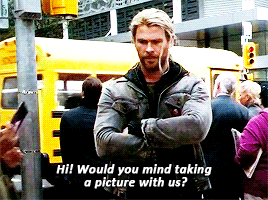
In no way is Ragnarok perfect. The neon bright, candy-coloured cinematography can be so overpowering at times that it can almost feel inappropriate and unnecessary. Even some of the major characters are killed off and quickly forgotten. However, these small flaws are of little importance to a film with an opening scene that makes you go, “Oh, yeah!”
0 notes
Text
Delightfully Bizarre

Riverdale
Around five months ago, the beloved Archie Comics were turned into a suburban teen drama airing weekly on the CW Network.
By next Wednesday night, we will be six episodes into the second season of this Pretty Little Liars-style murder mystery. Those who have yet to catch up may be wondering, ‘what has gone down since the season one finale?’ Well, you’re in luck, because I am about to tell you. Archie Andrews (K.J. Apa) drags his bullet-wounded father (Luke Perry) to Riverdale’s local hospital where his fate is left up in the air. The artsy bad-boy Jughead Jones (Cole Sprouse) is busy assuring his girlfriend Betty Cooper (Lilli Reinhart) that though tempted, he will not be joining his father’s gang, The Southside Serpents. Cheryl Blossom (Madelaine Petsch) burned down her own house with her mother inside of it. The first time we see her this season, she is wandering around the hospital on the same day as Archie, wearing her signature white and red gown. By the end of the season premiere, Archie’s former love interest, music teacher Ms. Grundy (tutor and serial pedophile) is murdered by a mysterious hooded figure. All of this happens in the 60-minute time constraint of the show. The weirdest, most non-sensical program on television right now is finally back.
Since season one, Riverdale has disregarded all traditional narrative demands. It can easily be said that the reason for this is because dozens of wacky things were thrown at us in each and every single episode. The season’s main plot was meant to focus on solving the murder of Jason Blossom, but so many things were happening to the living characters that it became harder and harder to care about the central subject. Time and time again, the writers of the show indulged viewers with continuous surprises.
Something that is particularly interesting about this delightfully bizarre program is that most scenes are broken down into small sequences ranging in duration from 15 to 90 seconds, which could roughly fit into about 10 to 12 comic book panels. Funny, since the show is based on the Archie Comics (although the names of the characters is the precise point in which the resemblance between show and comics stops). All of the characters, though playing 16-year-olds, are far beyond their years in terms of physical attractiveness. They have been polished to look much more beautiful than some of their individually flawed comic book characters.
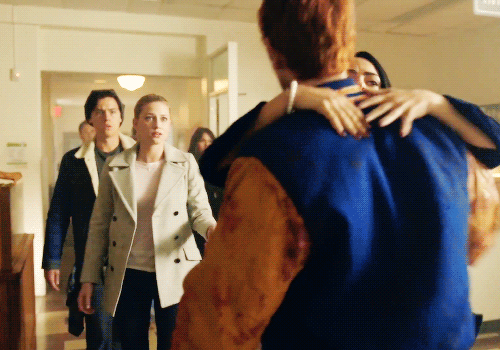
“It’s been a week since the discovery of Jason Blossom’s body. But his death would not be the first, nor would it be the last casualty that the town of Riverdale would suffer.”
In its opening season, Riverdale features two different timelines; it’s main storyline of the present day, and the flashbacks of events that occurred around the time of golden boy Jason Blossom’s death. Narrating each episode is Jughead, typing away on his computer as he puts together his novel about the town of Riverdale.
Looking at season 2, the show explores new techniques and even stranger narrative styles. In the first episode, we see a number of near-death hallucinations. After Archie’s father has been brought to the hospital, he lingers in a dream-like state filled with visions of his son’s life. Fred Andrews, though unconscious, is able to picture his son’s graduation, engagement, and wedding day. The final flashback even features some of Archie’s high school friends, though it appears that none of them have aged even though time has passed.
Though Riverdale has its flaws and plot holes, it is a show that continues to keep fans hooked. With musical numbers, mysterious killers, and a soundtrack pulled straight from the Top 40 Charts, Riverdale is as visually and aesthetically pleasing as it is unusual. One could say that the show is like an otherworldly place where there are no closed doors. The writers leave it open so that just about anything can happen.
0 notes
Text
Bigger Monsters, Higher Expectations
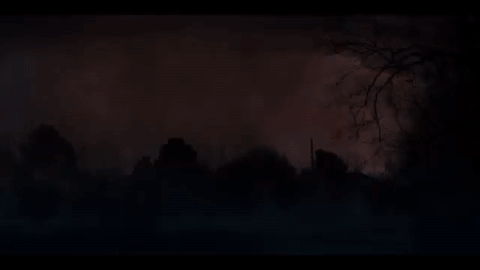
Stranger Things 2
Put up those Christmas lights and stock up on Eggos - Stranger Things has finally returned!
I can relate to fans of Stranger Things on a very personal level. I have merchandise from the show all over my room, I’ve binged the first season likely over twenty times, and I’ve even met three of the young stars of the show. But like most fans, I was nervous about what would become of the sequel of this captivating show. Would it make sense? Would it answer some of the burning questions that the first season had left me with? Would I even like it? The answer to all of the above is yes. Good work, Duffer Brothers.
We pick up around October of 1984, almost a year after everything had become stranger in the town of Hawkins, Indiana. It seems that things have gone back to normal now that the craziness is behind everyone. However, it seems that some of the events that plagued Hawkins have left permanent scars on a number of its victims. We catch up with the characters just days before Halloween, or as Mike Wheeler (Finn Wolfhard) calls it, “the best night of the year.” Speaking of Mike, it is highly upsetting to see that his heart is still broken now that his love interest, the telekinetic Eleven (Millie Bobby Brown) has quite literally vanished into thin air. When we catch up with the town Sheriff Jim Hopper (David Harbour) he appears to be keeping secrets about something... or someone. The mother of “the boy who came back to life”, Joyce Byers (Winona Ryder) is trying to focus on herself now that her son is safe and sound. She has a new boyfriend Bob (Sean Astin), who she had known back in High School, though it is clearly implied that Joyce was very popular in her teen years and had not even known Bob’s name. Nancy Wheeler (Natalia Dyer), and Steve Harrington (Joe Keery), are, as the final episode of season one sneakily revealed, still a couple even after the violent altercation between Steve and Jonathan Byers (Charlie Heaton), the shy, mysterious older son of Joyce who is also in love with Nancy. However, it seems that Steve’s days of being top dog at Hawkins High School may be coming to an end, as he has finally met his match. Billy (Dacre Montgomery) has just moved to town. He’s the intimidating stepbrother of Maxine (Sadie Sink), another new character who is quick to make friends with Mike, Dustin (Gaten Matarazzo), and Lucas (Caleb McLaughlin).
The first thing that stood out to me about this season is the killer new soundtrack. An eerie mood is set in almost every scene through the use of chilling drums and synthesizers. At any moment in time, our feelings about what is happening can jump from gloomy to cheerful. Well, as cheerful as a show about monsters from another dimension can possibly get. Anyhow, it is safe to say that where there is an important moment in an episode, viewers are sure to find a fitting song to accompany the story on its path. Matt and Ross Duffer even threw in a few fun tunes, such as the Ghostbusters theme featured in the Halloween episode.
The most notable element of the entire series (and the reason why it draws audiences of almost all ages) has to be its ability to capture the nostalgia of the '80s. There are shots of the boys riding iconic Raleigh chopper bikes (shots similar to those found in classic films like E.T.), appropriate television programs and commercials of this era, along with spot-on costume choices.
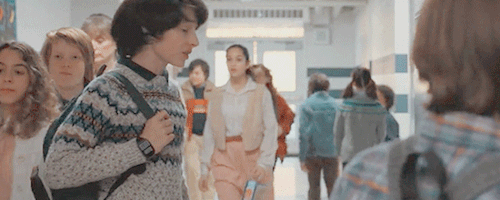
It is a well-known fact that sequels often do not live up to their predecessors. The plot of Stranger Things 2 is not quite as fresh, rich, and fast-paced as the show’s debut, but this does not mean that it is not worth watching. Most of the action and intensity picks up at around episode 5 (by far my favourite of the season) with a slight decline around episode 7. But fear not, it is the lovable characters that continue to keep us hooked, and I promise that there is a satisfying ending. On the contrary, the character development seen this season is absolutely phenomenal. A certain character (I won’t spoil, you’ll just have to watch!) who was often left in the background last season is built up as a hero in an extraordinary way. I’ll also give a solid A grade for the overall cinematography this season. I either found myself leaning in closer to the action, or away from it during some of the more chilling moments. The stunning visual effects are a fantastic addition to the series, making our encounters with the various monsters nothing less than a thrilling experience.
As a super-fan, my verdict is that season 2 is a must-watch for people who love the show as much as I do. Though the plot progresses at a slower-pace, is slightly less gripping and does not leave viewers with as many important questions as the last season did, The Duffer Brothers have done fantastic work in creating a satisfying sequel to one of the most hyped-up shows on Netflix. On top of all of this, the Halloween release date is pure genius, I applaud the creators for that alone. By the end of the season, we are still left with a large conflict that I look forward to exploring once season 3 rolls around.
For those who have not watched the first season yet, I highly recommend that you get caught up as quickly as possible! And if you have already binged the series, Netflix has also put out a behind-the-scenes feature titled “Beyond Stranger Things”. Enjoy!
4 notes
·
View notes
Text
What Are You Afraid Of?
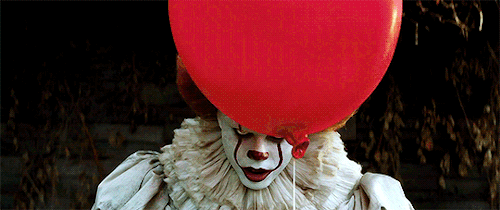
IT
“When you’re a kid, you think that you’ll always be... protected, and cared for. Then, one day, you realize that’s not true. If you open your eyes, you’ll see what we’re going through. ‘Cause when you're alone as a kid, the monsters see you as weaker. You don’t even know they’re getting closer. Until it’s too late.”
With a solid cast and visual flair, Andy Muschietti keeps this chilling Stephen King adaptation afloat.
IT is the story of seven bullied children who call themselves “The Loser’s Club”. On the verge of becoming adolescents, they each come face to face with a demonic shape-shifter commonly known as “Pennywise The Dancing Clown”. The child-eating alien returns to the small town of Derry, Maine every 27 years before going back into hibernation. Unlike the original 1990 adaptation, this film focuses entirely on the childhood stage of the characters’ lives. Muschietti’s take on the classic horror tale is an assemblage of hallucinatory, insane, and utterly terrifying puzzle pieces. The jump-scares and gloomy scenes, however, are evenly distributed amongst the moments of nostalgic kid humour. It’s safe to say that IT is many things; a popcorn flick about gruesome child murders, a gold mine of suspenseful set pieces, and a series of realistic coming-of-age moments.

Jumping from the 1950s to October of ‘88, the story spans roughly around nine months beginning with the very first encounter that a child has with Pennywise (Bill Skarsgard). In the roughneck township of Derry, Maine, we witness the brutal murder of six-year-old George Denbrough (Jackson Robert Scott). This famous yet controversial opening scene was in complete synchronization with the novel. The way King describes the playfulness of the young child frolicking through rain puddles as he chases after his paper boat was successfully adapted beat-for-beat. After the boat slips into a storm drain, Georgie is met by the malicious clown. Innocent Georgie is easily tricked into inching closer and closer to his demise.
Months later, George’s older brother Bill (Jaeden Lieberher) still has hopes of finding his brother alive, though his friends do not seem as positive. He is consumed by guilt for letting Georgie go out on his own, and now struggles with his home life. Meanwhile, MISSING posters distributed around town indicate that other children have mysteriously disappeared as well. As the final school bell tolls for summer vacation, Bill encourages his friends to ban together and help him to investigate the nearby sewers and streams for clues. the members of the Loser’s Club include the wise-cracking know-it-all Richie “the trash mouth” Toizer (Finn Wolfhard), Eddie Kaspbrak (Jack Dylan Grazer), an inhaler-carrying hypochondriac, along with Stanley Uris (Wyatt Oleff), the son of a Rabbi who is nervously unprepared for his upcoming Bar Mitzvah. Though his friends attempt to show support, they are clearly more interested in cracking jokes and talking about girls. Not to mention, avoiding the sinister wrath of the school’s psychotic bully, Henry Bowers (Nicholas Hamilton) along with the rest of his crew. Gradually, The Loser’s Club expands its members to welcome Ben Hanscom (Jeremy Ray Taylor), the shy new kid who would rather spend his time in the library than play outside with other boys. Next comes Beverly Marsh (Sophia Lillis), an outgoing tomboy with a bad reputation. Both Bill and Ben are quick to fall in love with her, and there are many instances of awkwardness between the three throughout the film. The last member to arrive in the group is Mike (Chosen Jacobs), a lonely home-schooler who works on his grandfather’s farm and appears to be the only African-American kid in the town. The flirtatious romance between Bill and Beverly is warm and believable, but in my opinion it is the character portrayals of Wolfhard and Grazer who truly take the cake. Wolfhard is quick to steal the show as the group’s only antagonist who doesn’t seem to have a filter. The teen actor rose to fame in the summer of 2016 when he made his debut as Mike Wheeler in “Stranger Things”. Richie, however, has been called a “complete 360″ from the 14-year-old’s television character. Wolfhard brings the character of Richie to life through his constant use of profanity and remarks of teenage wit. Jack Dylan Grazer makes clear connections with the dangerously neurotic character of Eddie, playing his hypochondria up at every given opportunity. He freaks out over paper cuts, rare diseases that his mother has warned him of, and anything even slightly unsanitary. The two of these characters are best friends, and putting their humorous banters together makes the film even more enjoyable.
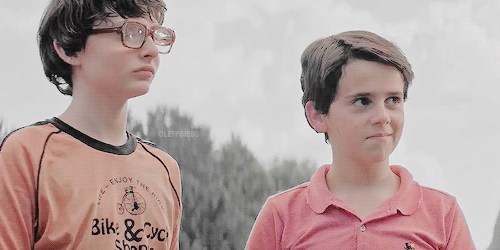
Of course, there is also still the primary issue of the predatory child-eating creature. Pennywise has individual encounters with each member of The Loser’s Club, appearing in the form of whatever it is that each child fears the most before shifting back into its default clown form. Eventually, the kids all meet up and admit their experiences to each other. After doing some research on their town, Ben Hanscom comes to the conclusion that the instances of violence and murder in Derry are mysterious tragedies that seem to occur every 27 years. Bill, still desperate to find answers about his younger brother, leads his friends to go looking for Pennywise. Together, all seven of them venture into the town’s sewage system.
Though the film was given a solid R rating when it “floated” into theatres last month, I felt that it was a slightly tamed down version of the novel. A few of the more graphic sections of the book had been cut in this remake, and the majority of the action is generally clean and comprehensibly staged, particularly a longer scene taking place inside 29 Neibolt Street, Pennywise’s home.
In the words of Stephen King himself, “adults are the real monsters”. Though more than half of the novel was cut down to fit into this two hour and fifteen minute remake, Muschietti picks up on one of the most important elements of Stephen King’s work: the overall idea that young people are all burdened, in their own individual way, with the adult world. A large portion of the film occurs with no parents or teachers in sight. When adults are included, they are manipulative, abusive, cruel and hostile towards those who they should be caring for. A couple of the adults are even shown to struggle with alcoholism and drug abuse. Muschietti covers a lot of ground with this ideology.
0 notes